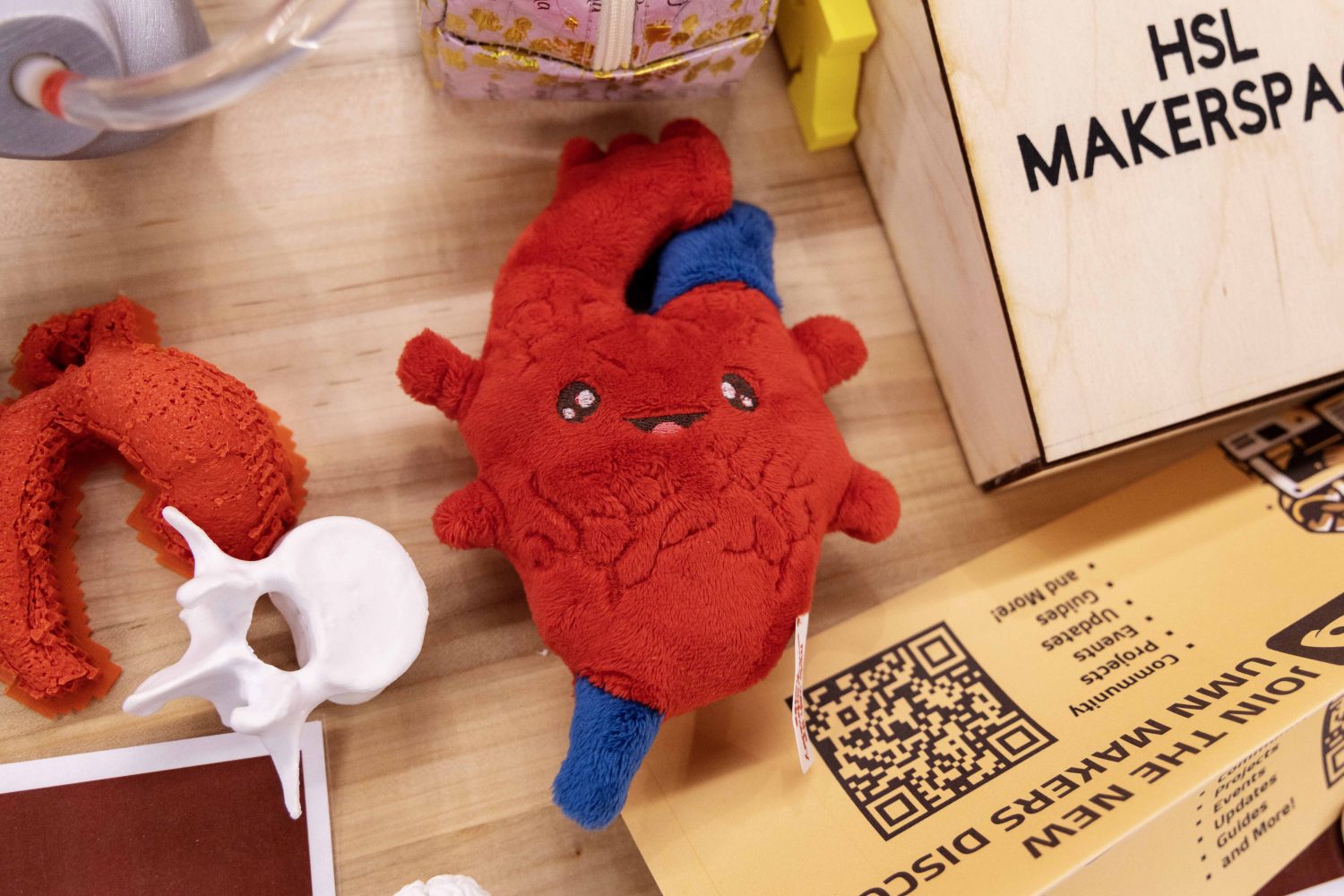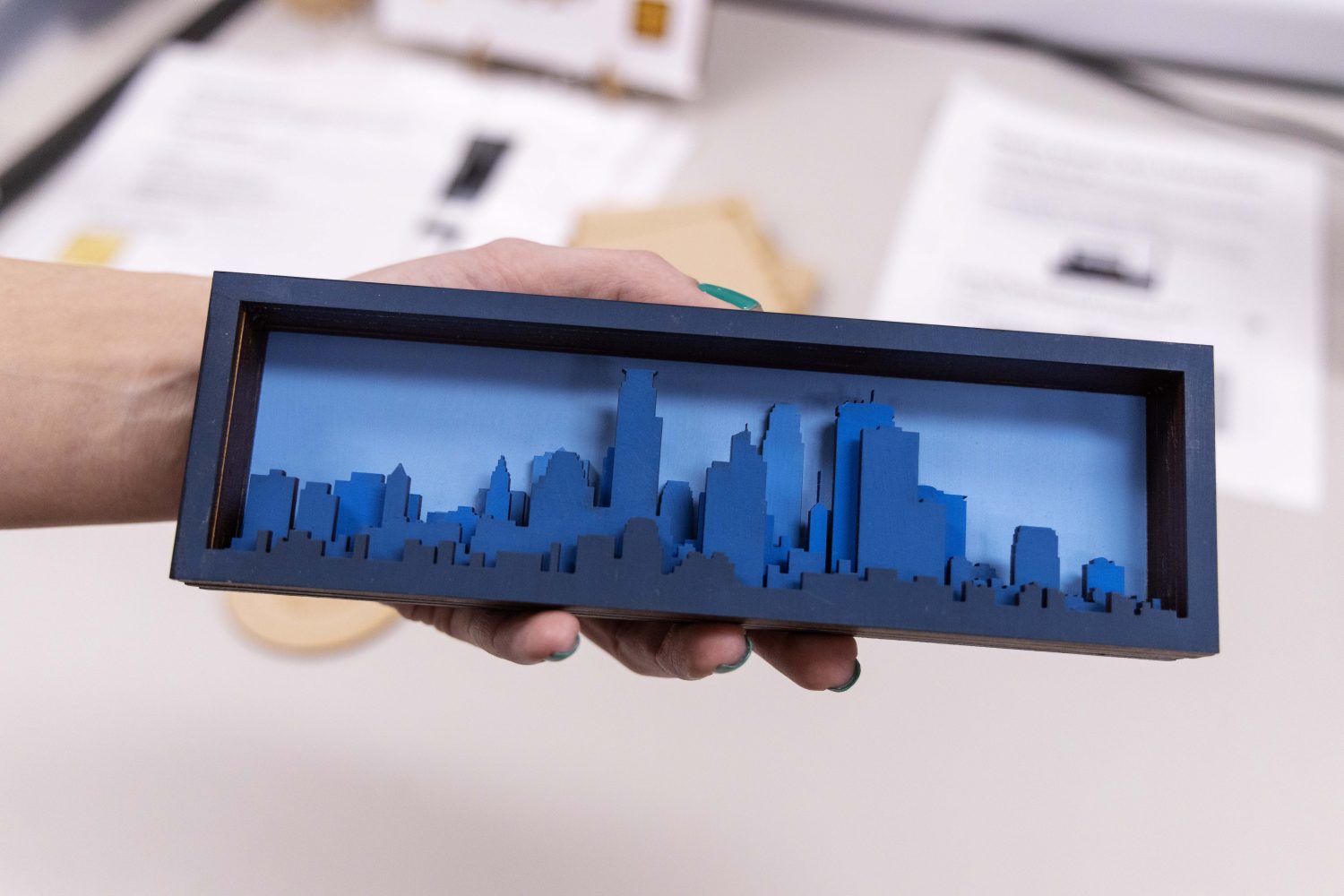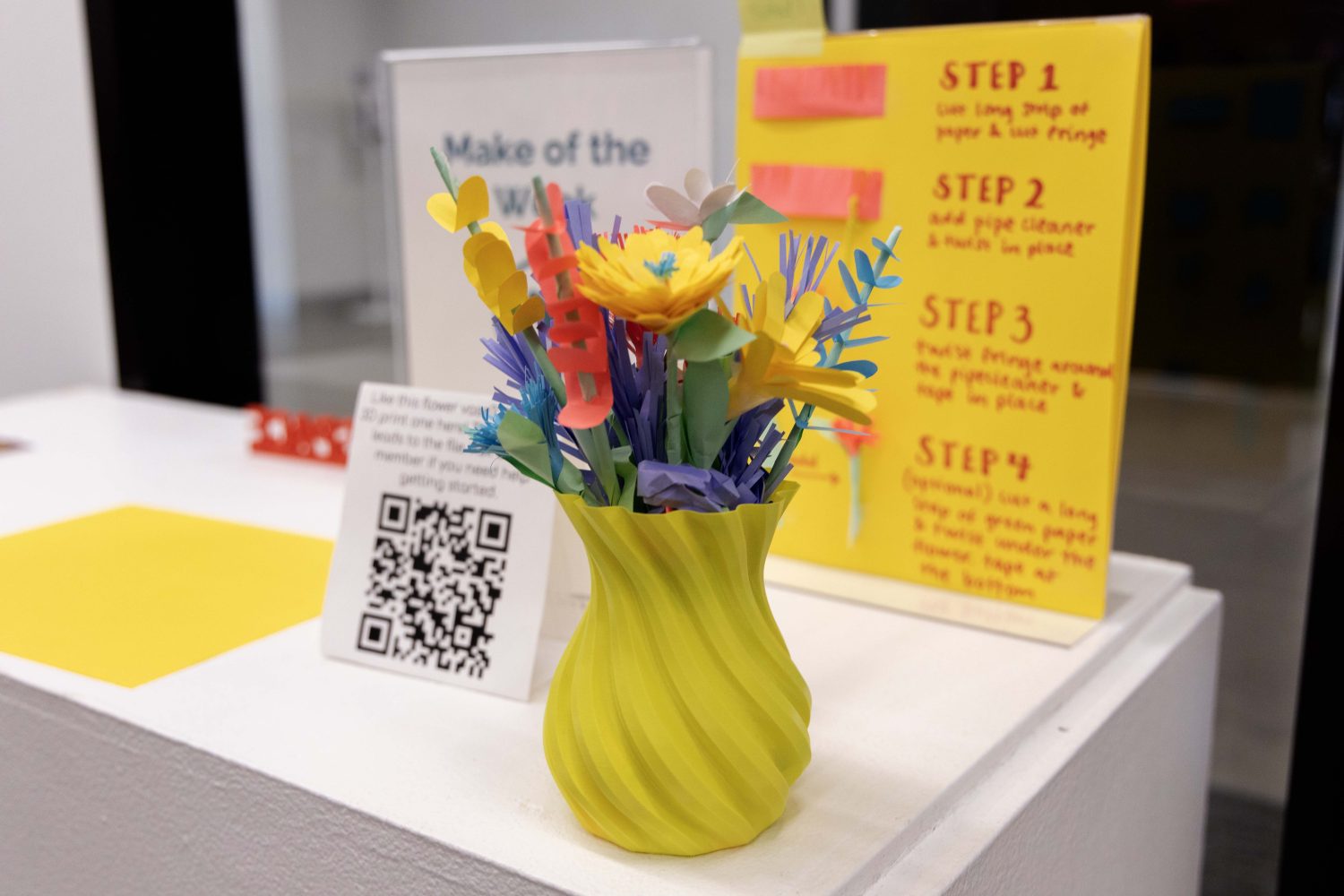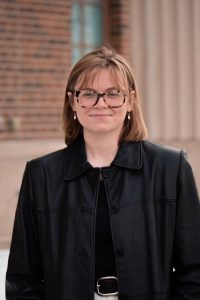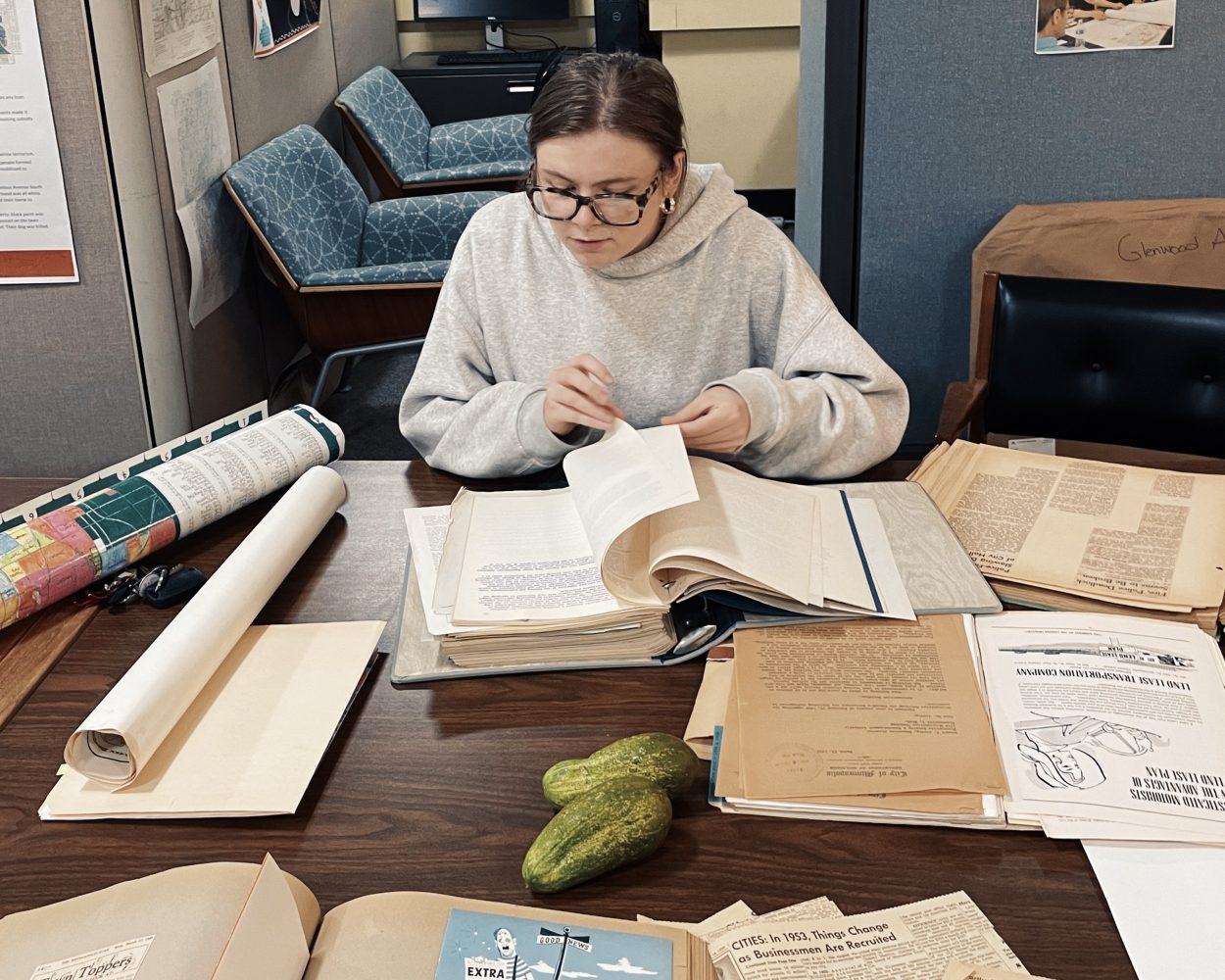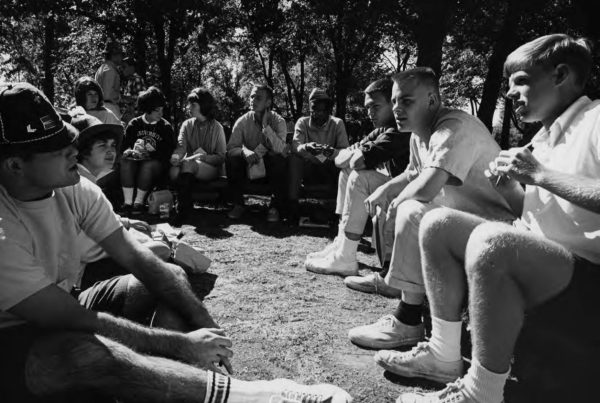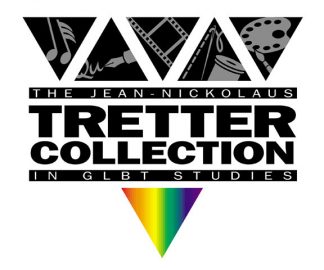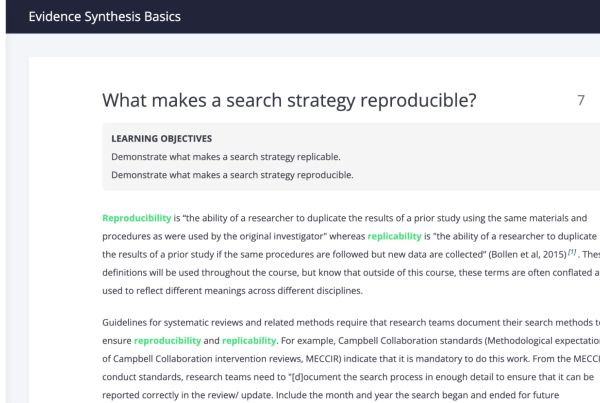You can spot them behind the circulation desk, reshelving books in Wilson Library, teaching others how to use 3D printers in the Makerspace.
The University of Minnesota Libraries has over 200 student employees, serving on the frontlines and behind-the-scenes to keep the semester running on-track for their fellow students, as well as faculty, staff, and researchers.
Every year members of the Friends of the Libraries’ awards committee recognizes three outstanding student employees who not only demonstrate continuous excellence, but also uniquely further the Libraries’ mission of community and scholarship.
All student employees in the Libraries are eligible, regardless of position, responsibility, or unit size. Each of the outstanding student employees receives a $500 award to honor their hard work and dedication.
This year’s winners are Abby Zumbrunnen, a peer research consultant and social media manager; Cara Dreifuerst, a Makerspace and Virtual Reality specialist; and Kelly Rogers, a research assistant and communications manager for Mapping Prejudice.
Your local guide to the Libraries
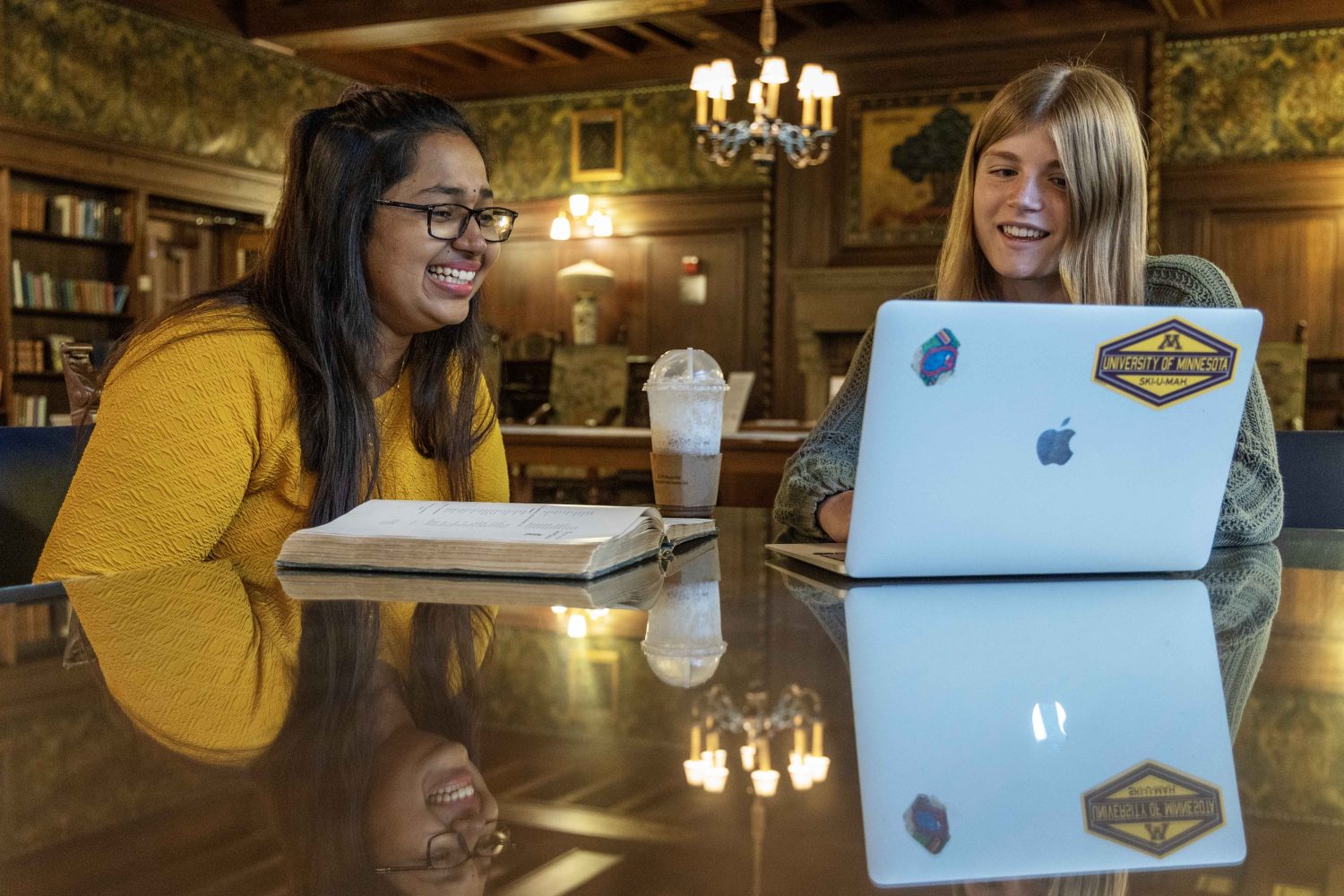
Anupama Rao and Abby Zumbrunnen, two peer research consultants, pose for a candid portrait at Walter Library on Friday, Sept. 22, 2023. (Photo/Adria Carpenter)
Abby Zumbrunnen grew up in the academic community. Both her parents work for the University of Wisconsin. So when she started touring campuses, she wanted to attend a college that was still close to home in Middleton, Wisconsin, but wasn’t right across the road.
Crossing the St. Croix River into Minnesota seemed more manageable, with its in-state tuition and shared midwestern culture. Still, Zumbrunnen was starting fresh on a campus of 50,000 students and didn’t know a single one of them.
She wanted to find a part-time job to help find a community, and the Libraries had a strong reputation among upperclassmen for its flexibility and working environment, she said. When a position opened up with the Peer Research Consultants, it seemed like a natural fit, given her prior experience tutoring biology in high school.
Zumbrunnen joined the PRCs at the start of her sophomore year in fall of 2022, and the following semester, she also became a social media manager for the Libraries. She enjoys the one-on-one interactions she has with other students, especially those from other areas of study, people she normally wouldn’t have the opportunity to talk with.
It’s rewarding to help those students find resources and navigate the Libraries’ website, she said. Research and databases can be daunting for incoming students, but it’s easy when you have someone guiding you through the process.
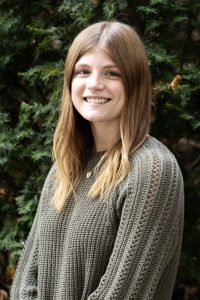
Abby Zumbrunnen, a peer research consultant, poses for a portrait outside Walter Library on Friday, Sept. 22, 2023. (Photo/Adria Carpenter)
“I remember being a freshman and not knowing what the hell I was doing on half my assignments. So it’s cool to be able to help out with that,” Zumbrunnen said. “We get pretty comprehensive training on how to do academic research and use scholarly sources and databases. Some of which I already knew, but a lot of it I didn’t. So my own skills have been enhanced.”
Now a junior, Zumbrunnen is double majoring in political science and biology, society, and environment. She’s also minoring in Spanish and statistics. Her interest in health sciences first developed in high school, and throughout college that interest has narrowed on the intersections of public health policy, law, and sociology.
As she transitioned into policy work, she decided to take on independent research projects outside her coursework, in addition to her senior thesis. Her current project studies the denial of medical care as a tool of genocide, using case law in International Criminal Court and the International Court of Justice.
Working as a PRC has been invaluable in Zumbrunnen’s academic life. Knowing how to navigate databases and find scholarly sources has saved time in her workflow and made research smooth and efficient.
“You’re basically getting paid to learn things that are going to further your skills and your academic and otherwise career,” she said. “It’s topical to why we’re in school, and you’re going to learn a lot of stuff that it’s going to help you in your future.”
In summer of 2023, Zumbrunnen interned with the Cancer Legal Center, a nonprofit providing free legal services to people with cancer. There she learned that with legal and policy knowledge, she can become a strong advocate in health care and help make societal change. After graduation, she plans to attend law school at either the Boston University School of Law or here at the University of Minnesota Law School.
The Libraries has “definitely” prepared her for law school. Beyond research skills, she’s learned how to work with others, think on her feet, and how to network and market herself in an increasingly online world.
“Those skills are all going to be really important going into grad school and then working as a lawyer, finding a job, just interacting with people on a day-to-day basis,” she said. “It’s just opened up more doors.”

Anupama Rao and Abby Zumbrunnen, two peer research consultants, pose for a candid portrait at Walter Library on Friday, Sept. 22, 2023. (Photo/Adria Carpenter)
Zumbrunnen has held over 50 research appointments with undergraduate students, making her a highly sought-after PRC, said Andrew Palahniuk, the Peer Research Consultant Lead.
“Abby is one of our lead PRCs. She is always willing to take on any task, is first to volunteer for special assignments, and is one of our ‘go to’ PRCs when we have a complex need for student help,” Palahniuk said.
And the students agree. The after-visit comments repeatedly note her professionalism and expertise.
“It’s intimidating to approach professors, and it helps to talk to peers who have been in the same situation before,” one student wrote.
Apart from helping students, Zumbrunnen loves her coworkers and supervisors, as well as her schedule flexibility. She even convinced her roommate Olivia Peche to join the PRC team too.
“It’s nice to have an outlet here with supervisors and adults who are really friendly, who I can talk to,” she said. “I recommend the Libraries to everyone I know who’s looking for a job.”
The Makerspace’s longtime architect
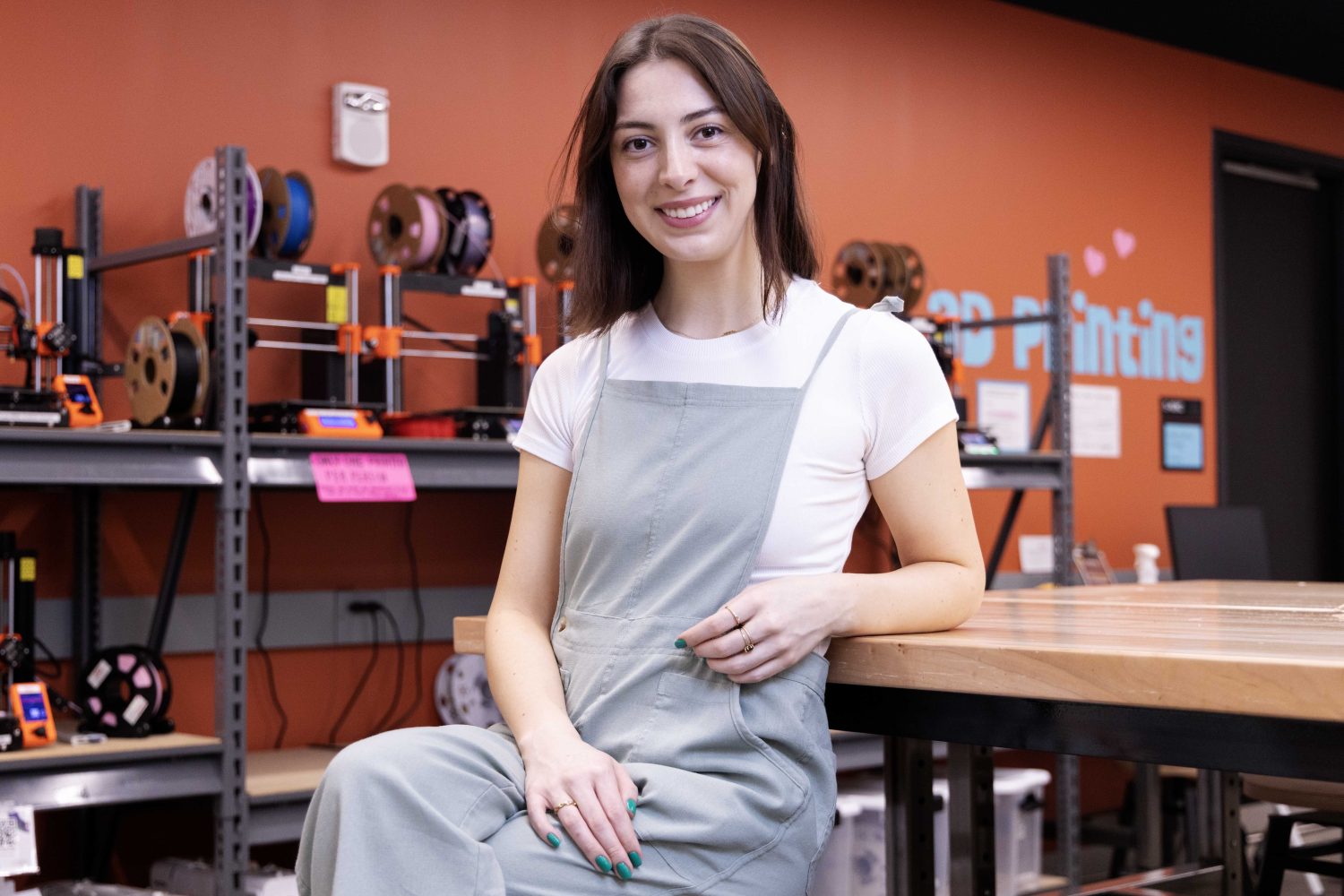
Cara Dreifuerst, a graduate student worker in the Makerspace at the University of Minnesota Libraries, poses for a portrait on Thursday, May 2, 2024. (Photo/Adria Carpenter)
Since the Libraries’ Makerspace opened in 2021 in the Health Sciences Education Center, there’s been plenty of changes. But as the space expanded and took shape, Cara Dreifuerst has been the sole constant, the familiar face behind many of its core features.
Dreifuerst, of Rhinelander, Wisconsin, came to the U of M because she wanted to live in a city and liked the architecture and design of the campus. No surprise then that Dreifuerst is finishing her master’s in design, specifically human factors in ergonomics.
This field of study revolves around human-centered design, like creating prosthetic limbs and wearable technology, or even redesigning classrooms to optimize learning and feel more welcoming. Dreifuerst previously completed her bachelor’s here, an individualized degree in German, communications, and interdisciplinary design.
Dreifuerst knew she wanted to work in the Libraries. In high school she spent her free periods in the library, and it always felt like home. The school librarians welcomed her and supported the projects she devised in-between classes.
“I’ve always been super drawn to libraries. I always find myself ending up in one,” she said.
When she saw an opening at the Makerspace, a hub for design and creation, it was meant to be. She started there in fall of 2021 and she’s watched it evolve and find its identity.
At first, students thought the Makerspace was a classroom, closed except during certain hours and open only for certain students, she explained. Later on, they trickled in to eat lunch or do homework. But now, students come to Makerspace with a specific project in mind.
- “Make of the Week” projects in the Makerspace designed by Cara Dreifuerst, a graduate student worker, on Thursday, May 2, 2024. (Photo/Adria Carpenter)
- “Make of the Week” projects in the Makerspace designed by Cara Dreifuerst, a graduate student worker, on Thursday, May 2, 2024. (Photo/Adria Carpenter)
“No one really knew about this space, and we were still trying to figure out what we wanted this space to be,” Dreifuerst said. “Now people have a much better understanding of how they can use this space. They understand more of the potential here.”
But to hear her supervisors tell it, Dreifuerst was the invisible hand guiding that development. She introduced the “Make of the Week” activity, a beginner-friendly project that helps students learn about the space and its tools, which they can then apply to their own creative ventures. She’s led workshops that cultivate community, creativity, and belonging, and has also developed training programs.
“The Makerspace, under her influence, has become not just a place of work but a welcoming community hub,” said Steven Bleau, the Makerspace lab manager. “She has not only grown with the space, learning all the equipment and continually enhancing her skills, but she has also been instrumental in shaping its culture and guiding its expansion.”
Dreifuerst has designed and created over 50 maker projects, her “crowning achievements,” which are now on display as promotional materials for the Makerspace and build guides. These projects are tangible sources of inspiration for other students, an embodiment of the space’s collaborative spirit and potential.
As much as Dreifuerst has shaped the Makerspace, it’s also shaped her. In her coursework, she’s interested in accessible design, how to make physical and digital spaces work better for the people who use them. And the Makerspace has encouraged her to think deeper about the fabrication process, the building and creation of physical objects, using tools like 3D printers and laser cutters. Plus now she can add 3D printing and 3D modeling to her resume.
She’s also learned how to tutor others and deconstruct confusing topics into digestible steps. She loves watching students who are initially intimidated by the Makerspace, and skeptical of their own abilities, learn how the space works, gain confidence in themselves, and leave with a physical reminder of their progress.
- “Make of the Week” projects in the Makerspace designed by Cara Dreifuerst, a graduate student worker, on Thursday, May 2, 2024. (Photo/Adria Carpenter)
- “Make of the Week” projects in the Makerspace designed by Cara Dreifuerst, a graduate student worker, on Thursday, May 2, 2024. (Photo/Adria Carpenter)
“That is super rewarding,” she said. “It’s very easy to get discouraged. So it’s really cool when students can see a project through and feel good about what they’re capable of.”
Dreifuerst graduated this past semester and hopes to find a place like the Makerspace, an environment that will enrich her designs and passions, and provide ancillary support to complete them.
“I wish I could just do this forever. I wish I could just be in a lab of some sort where I get to make things all day,” Dreifuerst said. “I’d love to do fabrication design for museums or even set design, but I’m also not shutting myself off from some of the accessibility things I learned in my program.”
The Libraries has been her first job where Dreifuerst has liked all of her coworkers. More so than designing new builds, she most enjoys the people she works with: her supervisors, fellow student workers, and all the fresh faces eager to create.
“I tell everyone to work here,” she said. “It’s totally worth it. It’s not one of those things where I’m kind of lying. I actually mean it.”
An advocate behind Mapping Prejudice
Kelly Rogers has only been at the Libraries for a year, but she’s already making headlines.
Rogers is entering her senior year as a non-traditional student, majoring in urban studies and minoring in geography and history. Before attending college, she took time off and moved from her home state of North Carolina to New York City.
In 2018 Rogers, then 18 years old, helped organize the New York City March for Our Lives and later joined the production company Women Rising, working as a line producer for the film, “WE GO HIGHER: A Documentary of Hope from the 9/11 Kids.”
She returned to North Carolina during the 2020 pandemic and transitioned into housing justice advocacy, where she first heard about Mapping Prejudice and the University of Minnesota. Much of the injustices she witnessed, especially in low-income neighborhoods, are downstream from the historical underpinnings that Mapping Prejudice has researched and illuminated.
Figuring out the causes and conditions that created the modern housing crisis is part of the reason why she came to the University of Minnesota for urban studies, and why she would later on start working as a research assistant and communications manager at Mapping Prejudice.
In the year since joining the team, she’s gained that knowledge and much more. Her team members are at the top of their respective fields and have been abundantly generous with their training and expertise, she said. It’s been one of the most dynamic and interdisciplinary environments she’s been in, and she wouldn’t have it any other way.
“Thinking historically about these contemporary issues is really required in order to make any kind of material change,” she said. “I have gotten exactly the education that I wanted, working at Mapping Prejudice.”
Rogers writes the Mapping Prejudice’s monthly newsletter, helps manage and moderate their social media channels, creates educational and promotional materials, and assists with historical research.
One upcoming show Rogers pitched is “Stories from the Map,” an interview-style podcast featuring Twin Cities residents whose lives have been shaped by racial covenants. The podcast will hopefully premiere late summer or beginning of fall, and will provide a new avenue to learn about Mapping Prejudice’s work and local history, while also being easily digestible and shareable.
She also worked closely with Rebecca Gillette, the community engagement lead for Mapping Prejudice, on the event “Bridging the Faultlines: Stories of Racism, Resistance & Repair,” a two-part screening of several documentary shorts created by Twin Cities Public Television, which drew over 300 attendees in total.
“In my 20-plus year career as a supervisor to dozens of student employees, I have never worked with such an exceptional student employee as I have with Kelly Rogers,” Gillette said.
For Rogers, the Libraries is a sanctuary from the rigidity of traditional classrooms. There’s flexibility in both her schedule, for when life events occur or when coursework piles up, and in the type of work she does. It’s easy to find a specialized niche that meets her interests and challenges her.
“One of my big frustrations coming here as a non-traditional student, as an older student, was feeling kind of infantilized. I was just so desperate for something to balance the expected learning with really experiential learning and applied learning. And I’ve really found that here,” Rogers said. “Knowledge creation, knowledge sharing with community members, I think that alone is so different from what you’ll find in traditional academic settings.”
Finding that niche shrinks the scale of the University by providing a like-minded community with a shared goal that everyone works towards, one that comes with a sense of purpose and fulfillment.
“Our work is really well-respected, not just because of the work that’s being generated, but because it contributes to the larger goals of the Libraries to be in community and build relationships outside of the University,” she said.
Currently she’s studying for the LSAT, which she’s taking this summer in preparation for law school, either here at the University of Minnesota Law School or back on the East Coast. She plans to use knowledge of the law and public policy, in combination with historical research and context, to better advocate for housing justice.
Rogers feels honored to be an outstanding student library employee, and also seen.
“I didn’t know they did this, and I don’t typically get awards,” she said. “More people should give awards to people. It feels really nice.”
For incoming students, Rogers advises finding a place that will foster your academic experience outside your department or classroom. Those spaces will truly amplify your knowledge and understanding.
“And the Libraries is a great place to do that. People really want to see you thrive and want to see you do well. It’s a great place to find a support network in a really big school,” Rogers said. “That’s another thing I’d say culturally separates the Libraries. They meet you where you are. You can be a full human here.”


